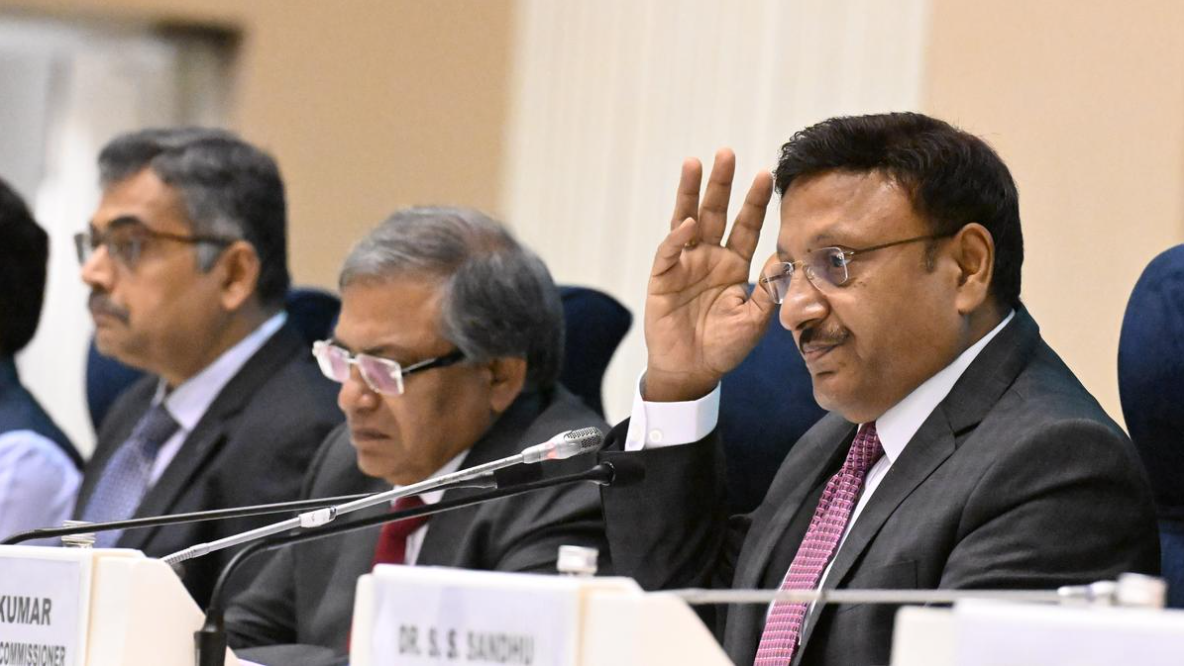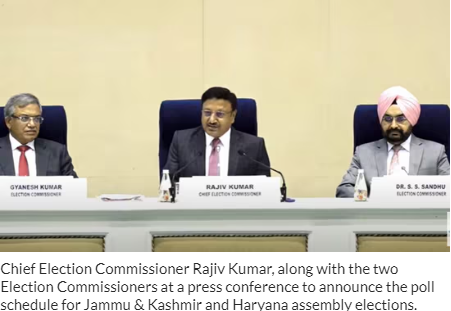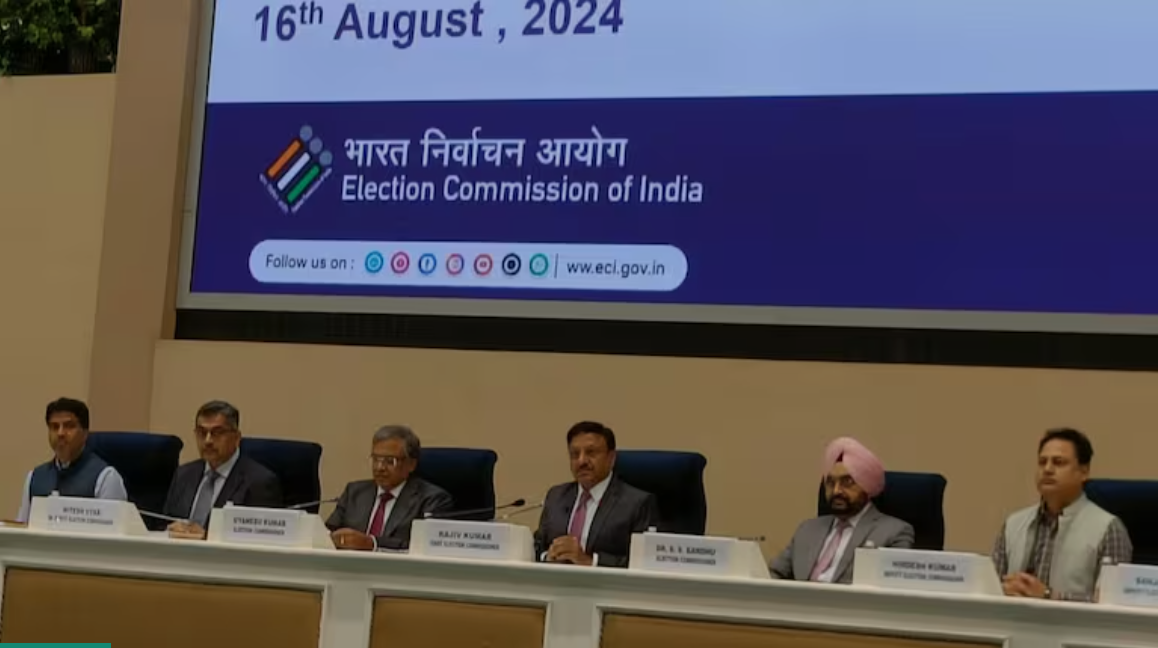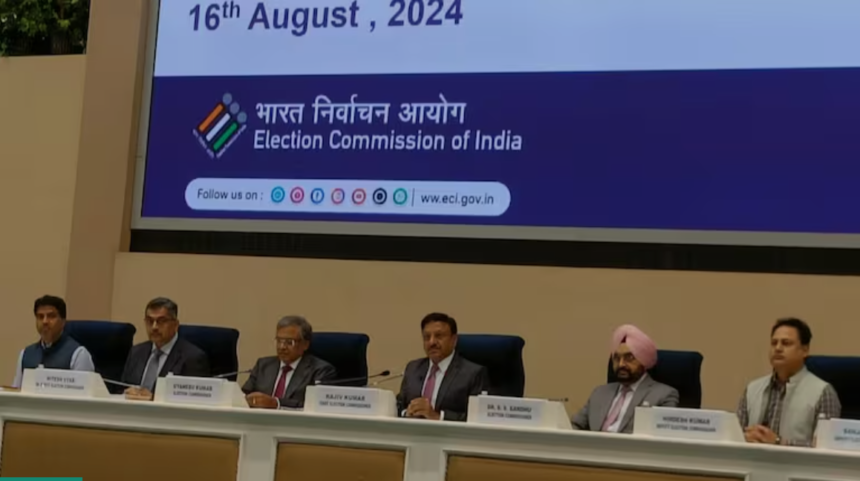Election Commission of India Announces Assembly Poll Dates:-
Election Commission of India in a significant development for Indian democracy, the Election Commission of India (ECI) has announced the schedule for the upcoming Assembly elections in Jammu & Kashmir (J&K) and Haryana. These elections are crucial as they reflect the pulse of the electorate in two politically distinct and strategically important regions. J&K will witness a three-phase voting process, while Haryana will go to the polls in a single phase. The results, to be declared on October 4, will set the tone for the political landscape in both states.
This article delves into the specifics of the election schedule, the political landscape in J&K and Haryana, the significance of these elections, and the potential outcomes and implications for national politics.
Election Schedule and Voting Phases
The ECI has laid out a clear schedule for the Assembly elections, taking into account the unique challenges and requirements of each region. Jammu & Kashmir, a union territory with a complex political history and significant security concerns, will have its elections spread across three phases. This phased approach is designed to ensure a smooth and secure electoral process, considering the region’s diverse geography and the need to deploy security forces effectively.
- Phase 1: Voting in J&K will begin on September 18. This phase will cover areas with challenging terrain and security concerns, where the movement of security personnel and election officials requires meticulous planning.
- Phase 2: The second phase is scheduled for September 25, focusing on constituencies that are relatively more accessible but still require careful attention to security and logistical arrangements.
- Phase 3: The final phase of voting in J&K will take place on October 1, covering the remaining constituencies. This phase will likely include the urban centers, where voter turnout is expected to be higher.
Haryana, in contrast, will conduct its election in a single phase on October 1. The state, known for its vibrant political culture and high voter participation, is logistically easier to manage in one go, given its relatively compact geography and fewer security concerns compared to J&K.
Political Landscape in Jammu & Kashmir
The upcoming elections in Jammu & Kashmir are particularly significant as they are the first since the region’s special status was revoked in August 2019, following the abrogation of Article 370. This move by the central government, led by the Bharatiya Janata Party (BJP), has dramatically altered the political dynamics in the region. The bifurcation of the erstwhile state into two union territories—Jammu & Kashmir and Ladakh—has also added new dimensions to the political discourse.
The key political players in J&K include the BJP, the National Conference (NC), the Peoples Democratic Party (PDP), and the newly formed Jammu & Kashmir Apni Party (JKAP). Each of these parties has a distinct voter base and political agenda, making the electoral battle complex and highly competitive.  for more information click on this link
for more information click on this link
- BJP: The BJP, which has been pushing for greater integration of J&K with the rest of India, will campaign on the platform of development, national security, and the benefits of the abrogation of Article 370. The party aims to make significant inroads in the Jammu region, where it traditionally enjoys strong support.
- National Conference: The NC, led by Farooq Abdullah and his son Omar Abdullah, will focus on restoring the autonomy and special status of J&K. The party has a strong base in the Kashmir Valley and will likely campaign on issues of identity, autonomy, and the protection of local rights.
- Peoples Democratic Party: The PDP, led by Mehbooba Mufti, will also emphasize the need to restore J&K’s special status. The party’s base is primarily in the Kashmir Valley, where it competes directly with the NC. The PDP’s strategy will likely involve a combination of appealing to regional sentiments and advocating for dialogue with Pakistan.
- Jammu & Kashmir Apni Party: The JKAP, a relatively new player in J&K politics, positions itself as a centrist alternative to the NC and PDP. Led by former PDP leader Altaf Bukhari, the party aims to attract voters disillusioned with the traditional political parties. The JKAP’s focus is on pragmatic governance and development, rather than the contentious issues of autonomy and Article 370.
Political Landscape in Haryana
Haryana presents a different political scenario, with a more straightforward battle between the BJP, the Indian National Congress (INC), and regional parties like the Jannayak Janta Party (JJP) and the Indian National Lok Dal (INLD). Haryana’s politics have traditionally been dominated by a mix of caste dynamics, development issues, and the personalities of key leaders.
- BJP: The BJP, which has been in power in Haryana since 2014, will seek to retain its position by highlighting its achievements in governance, infrastructure development, and law and order. The party will likely focus on consolidating its support among non-Jat voters, while also attempting to make inroads into the Jat-dominated regions.
- Indian National Congress: The INC, led by former Chief Minister Bhupinder Singh Hooda, will aim to capitalize on any anti-incumbency sentiment against the BJP. The Congress is expected to focus on issues like farmer distress, unemployment, and alleged corruption in the BJP government. The party will also seek to regain its traditional Jat vote base, which has been eroded in recent years.
- Jannayak Janta Party: The JJP, founded by Dushyant Chautala, has emerged as a significant player in Haryana politics. The party, which draws its support primarily from the Jat community, Election Commission of India will likely campaign on issues related to agrarian distress and youth unemployment. The JJP’s performance will be crucial in determining whether it can challenge the dominance of the BJP and Congress in the state.
- Indian National Lok Dal: The INLD, once a dominant force in Haryana, has seen its influence wane in recent years due to internal divisions and the rise of the JJP. The party, led by Abhay Chautala, will attempt to reclaim its lost ground by appealing to its traditional voter base and focusing on issues like farmer rights and rural development.
Significance of the Elections
The Assembly elections in J&K and Haryana are significant for several reasons. In J&K, the elections will serve as a litmus test for the central government’s decision to revoke Article 370 and its subsequent efforts to integrate the region more closely with the rest of India. The outcome will reflect the public’s response to these changes and will have implications for the future of the region’s political landscape.
In Haryana, Election Commission of India the elections will be a referendum on the BJP’s performance over the past five years. The state has seen significant developments in terms of infrastructure and governance, but issues like farmer unrest and unemployment remain contentious. The election results will determine whether the BJP can maintain its hold on the state or if the Congress and regional parties can stage a comeback.
The elections in both states will also have national implications. A strong performance by the BJP in J&K and Haryana would bolster the party’s position ahead of the 2024 general elections, Election Commission of India while setbacks could embolden the opposition and reshape the political narrative.
Challenges in Conducting the Elections
The ECI faces several challenges in conducting the Assembly elections in J&K and Haryana. In J&K, security remains a paramount concern, particularly in the Kashmir Valley, where militancy and unrest have been persistent issues. The ECI will need to coordinate closely with security forces to ensure a peaceful and fair election process. The phased voting in J&K is designed to mitigate these risks, Election Commission of India but the ECI will need to remain vigilant to address any security breaches or disruptions.  for more information click on this link
for more information click on this link
In addition to security concerns, logistical challenges such as ensuring voter access in remote and difficult-to-reach areas, particularly in the mountainous regions of J&K, Election Commission of India will require careful planning and execution. The ECI will also need to ensure that the electoral process is transparent and credible, particularly given the politically sensitive nature of the elections in J&K.
In Haryana, while security is less of a concern, the ECI will need to manage the logistical complexities of conducting a state-wide election in a single day. This includes ensuring adequate polling personnel, Election Commission of India maintaining the integrity of electronic voting machines (EVMs), and addressing any last-minute issues that may arise.
Potential Outcomes and Implications
The outcomes of the Assembly elections in J&K and Haryana are likely to have far-reaching implications for the political landscape of both regions and for national politics.
- In Jammu & Kashmir: A victory for the BJP in J&K would be seen as a validation of the central government’s policies in the region, including the abrogation of Article 370. It would also strengthen the BJP’s narrative of national integration and development. Conversely, Election Commission of India a strong performance by the NC or PDP would indicate that regional sentiments still hold sway, and that the demand for greater autonomy and the restoration of special status remains a potent political force.
- In Haryana: If the BJP manages to retain power in Haryana, it would reinforce the party’s dominance in northern India and bolster its position ahead of the 2024 general elections. A victory for the Congress or a strong showing by the JJP could signal a shift in voter sentiment and pose challenges for the BJP’s national leadership. The role of smaller parties like the INLD could also be crucial in determining the balance of power in the state.
Nationally, the results from J&K and Haryana will be closely watched as indicators of the public mood and the relative strength of the BJP and the opposition. The elections will also provide insights into the effectiveness of the BJP’s strategies in different regions and the resonance of its policy agenda among voters.  for more information click on this link
for more information click on this link
Conclusion
The upcoming Assembly elections in Jammu & Kashmir and Haryana are poised to be closely contested and highly consequential. In J&K, the elections represent a critical juncture in the region’s political history, as voters grapple with the changes brought about by the abrogation of Article 370. In Haryana, Election Commission of India the elections will test the BJP’s ability to maintain its hold on a state where it has enjoyed significant support in recent years.
The Election Commission of India, with its experience and expertise, is well-prepared to handle the challenges of conducting elections in these two diverse regions. As the election dates approach, the political temperature is set to rise, Election Commission of India with parties and candidates vying for the support of the electorate.
Ultimately, the outcomes of these elections will not only shape the future of J&K and Haryana but will also have broader implications for the political landscape in India. As voters in these two states prepare to cast their ballots, the nation watches with anticipation, knowing that the results will echo far beyond the borders of J&K and Haryana, Election Commission of India influencing the course of Indian politics in the years to come. ALSO READ:- Strengthening Ties: North Korea’s Kim Jong-un and Russia’s Putin Pledge Deeper Cooperation on Korean Liberation Day 2024






1вин официальный сайт вход https://1win6001.ru .
скачать mostbet на телефон скачать mostbet на телефон .
1 вин про 1win6020.ru .
1win win https://familyclub.borda.ru/?1-6-0-00002163-000-0-0-1743051813/ .
most bet http://www.mostbet6006.ru .
бк 1win https://familyclub.borda.ru/?1-6-0-00002163-000-0-0-1743051813/ .
mostbet официальный сайт mostbet6006.ru .
mostbet kg mostbet kg .
1вин вход с компьютера http://www.1win6001.ru .
1вин вход http://www.1win6001.ru .
wan win https://alfatraders.borda.ru/?1-0-0-00004932-000-0-0-1743258210 .
1win кейсы https://1win6049.ru/ .
1win. balashiha.myqip.ru/?1-12-0-00000437-000-0-0-1743258848 .
1 win. 1 win. .
1win официальный сайт регистрация 1win6049.ru .
1 win казино 1 win казино .
1win официальный 1win официальный .
1win футбол https://alfatraders.borda.ru/?1-0-0-00004932-000-0-0-1743258210/ .
1win.pro 1win.pro .
1 вин. 1 вин. .
мосбет svstrazh.forum24.ru/?1-18-0-00000136-000-0-0-1743260517 .
партнёрка 1win obovsem.myqip.ru/?1-9-0-00000059-000-0-0-1743051936 .
mostbet kg скачать mostbet kg скачать .
мостбет скачать http://www.svstrazh.forum24.ru/?1-18-0-00000136-000-0-0-1743260517 .
1win скачать kg http://1win6050.ru/ .
1win скачать kg http://1win6050.ru .
1вин официальный мобильная 1win6050.ru .
1 вин официальный 1 вин официальный .
1вин сайт официальный https://1win6051.ru/ .
1win.online https://www.1win6052.ru .
мос бет мос бет .
1win kg 1win6052.ru .
1win казино https://1win6052.ru/ .
1win.pro http://1win6053.ru .
скачать mostbet на телефон http://www.mostbet6029.ru .
mostbet kg mostbet kg .
1win онлайн http://1win6053.ru/ .
1win.pro 1win.pro .
1vin казино 1vin казино .
1win 1win5011.ru .
1win aplicația http://1win5011.ru .
1win 1win .
1win ru http://1win6009.ru/ .
mostber http://mostbet6012.ru .
мостбет кг https://mostbet6012.ru .
мастбет http://www.mostbet6012.ru .
1вин rossvya https://www.1win6009.ru .
1win скачать kg http://1win6009.ru .
1вин вход https://1win6046.ru .
Диплом университета РФ!
Без института трудно было продвигаться вверх по карьерной лестнице. Заказать диплом под заказ в Москве возможно используя сайт компании: graph.org/Diplom-za-odin-den-realnost-ili-mif-04-23
Мы изготавливаем дипломы любой профессии по приятным тарифам.– moonifie.com/read-blog/14624_kupit-diplom-o-sredne-specialnom-obrazovanii-nedorogo.html
Мы предлагаем оформление дипломов ВУЗов в Москве — с печатями, подписями, приложением и возможностью архивной записи (по запросу).
Документ максимально приближен к оригиналу и проходит визуальную проверку.
Мы гарантируем, что в случае проверки документа, подозрений не возникнет.
– Конфиденциально
– Доставка 3–7 дней
– Любая специальность
Уже более 4122 клиентов воспользовались услугой — теперь ваша очередь.
Посмотреть информацию — ответим быстро, без лишних формальностей.
Thanks for the article. Here’s more on the topic https://orenbash.ru/
Thanks for the article. Here’s more on the topic https://svetnadegda.ru/
Thanks for the article https://florinka.at.ua/forum/36-35254-1 .
Website https://cardsfm.ru/ .
Website – https://lostfiilmtv.ru/
Website – https://lostfiilmtv.ru/
La Clínica de Urología Moderna reúne opiniones reales de pacientes y detalles de cada procedimiento. Clínica de Urología Moderna
En este recurso de la Clínica de Urología Moderna se explican los tratamientos para diferentes problemas urinarios.
Todo sobre el uso de tecnología de vanguardia en urología lo explica la Clínica de Urología Moderna con detalle.
как оптимизировать пк и увеличить fps